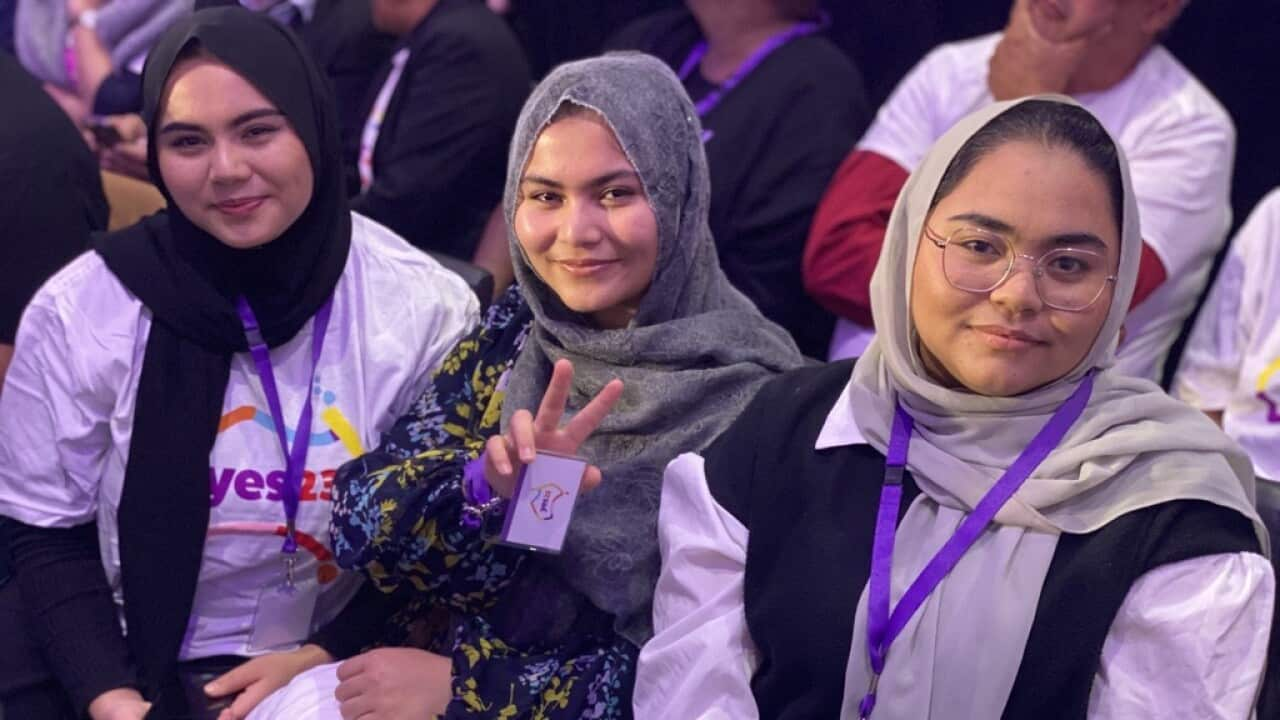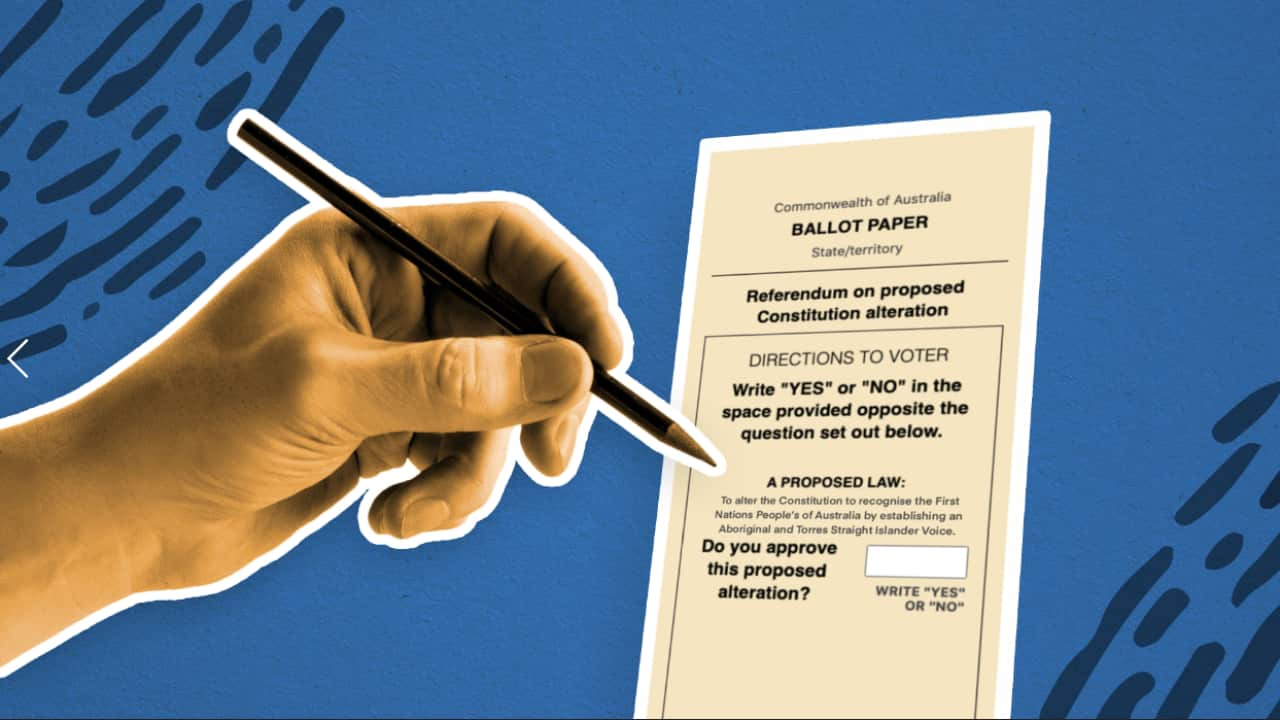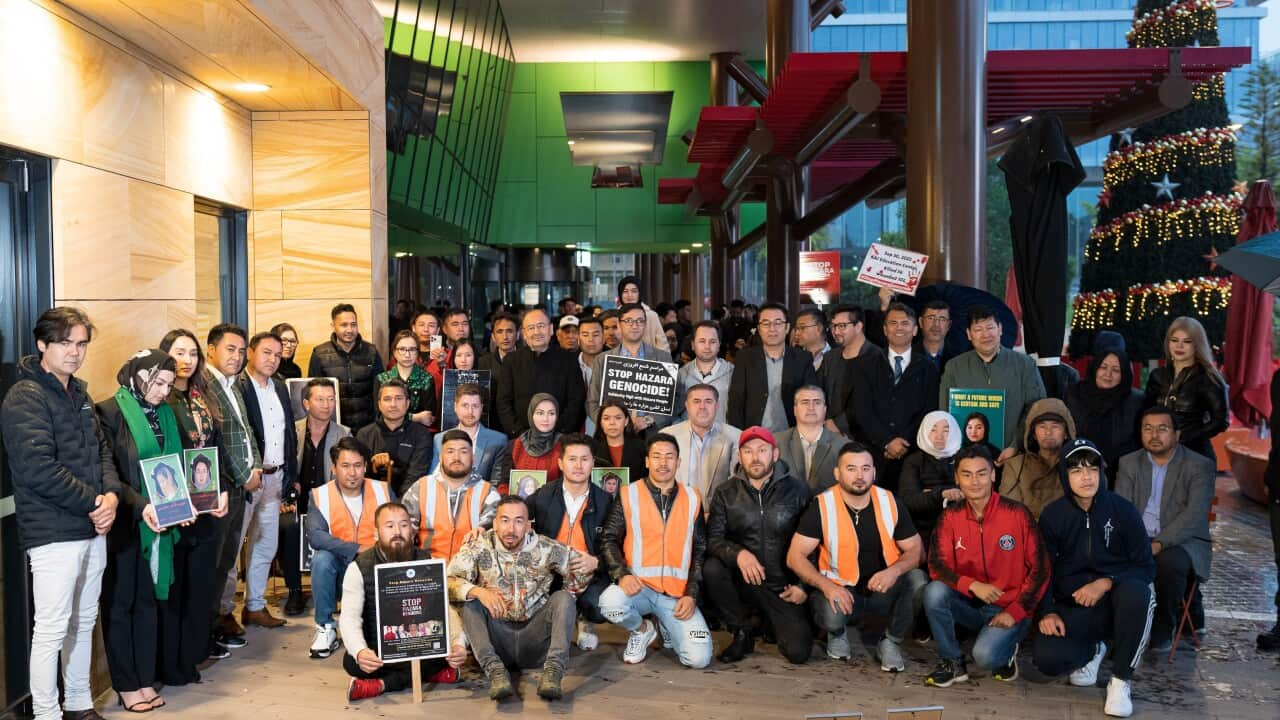Key Points
- A peak Hazara lobby group has announced it will back a 'Yes' vote in the Voice Referendum.
- The Hazaras are an ethnic group from the mountains in Afghanistan.
- However, others say the government should focus on more pressing issues such as the cost of living crisis.
SBS acknowledges that the views presented in this article do not necessarily represent the views of the whole community and are not a statistical representation of the Australian population.
Australia may be thousands of kilometres away from Afghanistan but when it comes to similarities and hardships, some members of the Hazara community say they share a strong bond with its Indigenous people.
It is these sentiments that have led to expressions of support among some Hazara community leaders to establish an Indigenous Voice to Parliament.
Who are the Hazaras?
Hazaras are a distinct ethnic group that originated from the mountainous region of central Afghanistan.
“During King Amir Abdul Rahman's rule, 62 per cent of the Hazara population was massacred, killed, displaced from their lands, their lands were confiscated ... they were forced to flee to neighbouring countries, forced to take refuge in the mountains,” Ahmad Ali Wafaq, from the Geelong Hazara Community, said.
Since then, he said the Hazaras had never been offered a chance to heal and overcome the trauma of the massacre, dispossession and enslavement by the successive rulers of Afghanistan.

Mr Wafaq says like Indigenous Australians, Hazaras have also been massacred. Credit: Supplied
During their first rule in 1990s, a Taliban commander infamously declared that the Hazaras should go to “goristan”- a Dari/Persian word for graveyard.
After their collapse and the establishment of a new democratic government by the West, the Hazaras seized the opportunity to embrace the new era and heavily invested in their children’s education.

Members of the local Hazara community in Dandenong, Melbourne, gathered for a vigil to honour the victims of a terror attack on a Hazara learning centre in Kabul on 20 November 2022. Credit: Supplied/Mehdi Rez
On 30 September 2022, a suicide bomber targeted a learning centre in a predominantly Hazara neighbourhood of Kabul, killing at least 54, most of whom were teenage girls, and injuring another 112.
The attack led to a weeks-long worldwide #StopHazaraGenocide campaign.
Subsequently, the City of Greater Dandenong Council in Melbourne’s southeast, home to more than 12,000 Hazaras, became the first government body in the world to “formally recognise and condemn the dramatic escalation of genocidal violence against the Hazara people in Afghanistan”.
It is believed that Australia is home to the largest Hazara population outside Asia and the Middle East.
‘Similar atrocities’
It is this past that “enables” the Australian Hazaras to “deeply empathise with the struggles and aspirations of the Indigenous people”, the Hazara Community of Geelong said in a statement.
Indigenous Australians have had a similar fate; we can say that they’ve had it worse than the Hazaras.Ahmad Ali Wafaq
“Since First Australians have really suffered in the past, have had tough times, their rights have been violated, they have not enjoyed their human rights; we thought it’s important and it’s our duty to stand for these rights and raise our voice for Indigenous Australians,” Mr Wafaq said.
Both sides of the referendum divide have been campaigning ahead of the October 14 vote.
Federal Opposition Leader, Peter Dutton, has dubbed the referendum proposal "the Canberra Voice”.
Speaking in Brisbane hours after Prime Minister Anthony Albanese announced that Australians would head to the polls in October, Mr Dutton argued Mr Albanese was “deliberately withholding” information from Australians over what they are set to vote on.
“You can't go to an election, asking people to make the biggest change to our Constitution in our nation's history, without providing the detail,” he told reporters.

Australian Hazara academic, Niamatullah Ibrahimi. Source: SBS / SBS News
He believes although the Hazaras had not been colonised by a foreign power, there were “major similarities” between the historical experience of this community and that of Indigenous Australians.
"We can see major similarities regarding the consequences and methods of these types of events in these two countries,” he said.
“There are similarities in that both groups ... the Hazaras and the Indigenous peoples of Australia lost their lands, and in the sense that there were very large and widespread killings,” he said.
“In both cases, the Hazaras today can see their history as similar to the history of the Indigenous Australians.”
Dr Ibrahimi believes the Voice “is an effort and struggle for social justice” and that this was something that the Hazaras had always fought for.
“Hazaras have been fighting for social justice for decades, and that’s why there is kind of identification and a sense of sympathy between the Australian Hazaras and the Indigenous Australians,” he said.
But Dr Ibrahimi said while Australia had been able to nurture a “very successful multicultural system” that reflected the different voices and historical experiences, Afghanistan had a long way to go.
“Australia’s political culture is very different to that of Afghanistan," Dr Ibrahimi said.
"In the past decades, Australia has been able to create a very successful multicultural system that not only reflects different voices and different historical experiences but also appreciates these, they’re actually encouraged and supported by Australian political groups and parties."
But, in Afghanistan, especially with the Taliban’s return, we faced a huge historical setback, where such voices are not only not recognised, but are actually suppressed by the Afghan government under the leadership of the Taliban.Dr Niamatullah Ibrahimi
“Compared to Australia, Afghanistan has many years ahead of it in order to create a political system in which not only different political groups of Afghanistan are represented in a clear and real way, but also seeks to compensate the suffering and calamities that have been historically imposed on different human groups inside Afghanistan," he elaborates.

(L to R) Lidia Thorpe, Jacinta Price and Peter Dutton are all against the Voice. Credit: Supplied/AAP
“Division, Division, Division, that's basically what this referendum is about. It's been this since the beginning and this is the decision that Australians are going to have to make now on October 14,” Opposition spokesperson for Indigenous Australians, Jacinta Nampijinpa Price, said.
However, not all opponents of the Indigenous Voice Referendum are on the same side of politics in terms of the basis of their opposition.
Independent Victorian Senator, Lidia Thorpe is part of a Blak Sovereign Movement that calls for a national Treaty between the federal government and Indigenous Australians.
The movement believes the government’s proposed model for the voice is symbolic and would not have enough power to fix the systemic issues facing Indigenous communities.
'Voice will create another layer of bureaucracy'
Hassan Varasi is an Adelaide-based Hazara businessman.
Mr Varasi said as a Hazara man who carries the trauma of discrimination from his motherland, he “deeply sympathised” with Indigenous Australians.

Hassan Varasi says the Labor government should 'get its priorities right' and focus on issues such as the current cost of living crisis. Credit: Supplied
Mr Varasi believes that instead of wasting taxpayers’ money on “a Referendum that has no chance of winning”, the government should prioritise helping Australians caught up in the middle of a cost-of-living crisis.
“At a time when Australians are experiencing a historically high inflation which has affected everyone’s life, and many people are struggling to make ends meet, the cost of the Referendum that has no chance of success is a sign of the irresponsibility of the federal government,” he told SBS Dari.
Mr Varasi said he believed the politicians’ true intention behind the push for the Voice was to “glorify” themselves in history rather than “a practical solution to eliminate discrimination against Indigenous Australians”.
He amplified one of the ‘No’ campaign’s arguments that the Labor government “wants people to vote for something unknown that looks like a blank cheque”.
Mr Varasi said the proposed Voice would add another layer of bureaucracy for the First Nations people and was “bound to become another irresponsible government body that even Parliament can’t dismantle”.
“Enshrining the Voice in the constitution will provide the basis for the abuse of [land] ownership disputes,” he added.
“Setting up the Voice will also lead to class tension and hatred between Indigenous and non-Indigenous people which may lead to non-Indigenous people seeing their role in the development of Australia ineffective.”




